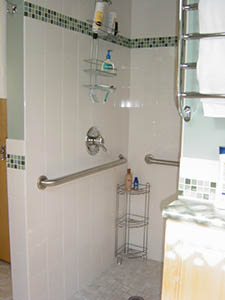RTC:Rural Brings National Attention to Importance of Accessible Housing in Rural Communities (MT UCEDD)
February 5, 2017

|
The lack of accessible housing is one of the biggest barriers people with disabilities face in their communities. Having a home that suits one's needs facilitates self-care and accessing the community, critical elements of independent living. Living in a home that doesn't meet one's needs can make accessing community more difficult and even impossible.
Research by the Research and Training Center on Disability in Rural Communities (RTC:Rural) focuses on the relationship between home accessibility and community participation for people with disabilities in rural communities. RTC:Rural is part of the Rural Institute for Inclusive Communities at the University of Montana.
RTC:Rural is proud to be recognized as an authority in the area of rural accessible housing. In December of 2016, RTC:Rural Director Dr. Craig Ravesloot, Ph.D., was invited to help organize "Affordable and Accessible Housing for Vulnerable Older Adults and People with Disabilities Living in the Community: A Workshop," sponsored by the National Academies of Sciences, Engineering, and Medicine. RTC:Rural project collaborator Dr. Bryce Ward, Ph.D., presented research at this workshop on the potential impact of home design features on community participation. Dr. Ravesloot facilitated a panel on Promising Models Connecting Affordable Housing and Services as a Platform for Health and Independence.
RTC:Rural's contributions to the national conversation on accessible housing are informed by their past and ongoing research on the subject. Through multiple studies, RTC:Rural researchers are examining the interaction between individuals and their home environments and its implications for community participation. Previous RTC:Rural research has found that there are high rates of inaccessibility for households with individuals who use mobility equipment. There is some urban/rural variation, but the problem is pervasive throughout the United States. RTC:Rural research suggests that people with disabilities whose homes are set up for easier use are more likely to participate in their communities.
Two current RTC:Rural projects in particular focus on home accessibility issues. The first is Effort Choice and Capacity, which will investigate the how bathing exertion is related to community participation. The second is Home Base, a collaborative project with the RTC on Promoting Interventions for Community Living at the University of Kansas, which will build a community-wide Home Usability Network to support people with disabilities to make home improvements.
For nearly 30 years, RTC: Rural has conducted disability research as part of the Rural Institute at the University of Montana. RTC: Rural is funded by the National Institute on Disability, Independent Living and Rehabilitation Research (NIDILRR) to improve the ability of people with disabilities to engage in rural community living.
The research described in this article is funded by grants from NIDILRR (RTC:Rural 90RT50250100; RTC:PICL 90RT5043; Effort & Choice 90IF0111). The opinions expressed are those of the authors.







